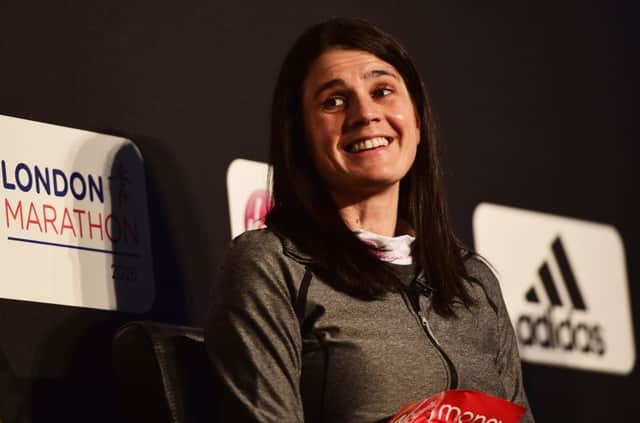Marathon runner Susan Partridge's Olympic target


“Even at breakfast, I don’t know what I’m supposed to eat. I’m sure I do manage to eat something sensible but it’s not a routine, compared to other athletes who have something rigid. As long as I’m not running around and doing something bizarre, I just go with it.”
Fortunately for Oban’s road warrior, there has been consistent method in her madness. And having performed with distinction at world and European championships, as well as two Commonwealth Games, she will doubtless contrive to reach the starting line in this morning’s Virgin Money London Marathon with genuine hopes of completing a full set of honours with qualification for this summer’s Olympic Games.
Advertisement
Hide AdAdvertisement
Hide AdA time of two hours and 31 minutes, and a spot among the first two British finishers, would assure her place. Time, however, is not on her side. Persistent back problems have been an acute reminder that Rio represents one last realistic shot at fulfilling her ultimate goal while potential reward still exceeds the likely risk.
“I don’t want that choice between running now or not being able to walk when I’m 50,” Partridge says. “I can’t jeopardise my long-term health and that’s becoming a factor. I might have to accept I can only run 40 miles a week and that would be fine.
“But it has felt better so you think: am I jumping the gun? I am really aware though that I can’t go on much longer with what I have career-wise, emotion wise, injury-wise, I’ve got to that stage where I feel I’ve at least tried to do everything I’ve wanted to do. But I haven’t set a deadline. It won’t be some dramatic retirement. It will be much more mundane than that. I’ll just get slower and disappear and people will forget about me.”
If coming tenth at the 2013 world championships has surely left an indelible mark, reaching an Olympics would be one more notable souvenir. Up to five British women, including fellow Scot Freya Ross, will likely be engaged in a domestic race within a race, well adrift of the African superstars who traditionally climb on to London’s podium.
For the home contingent, the route to Rio seems clear. Partridge, a researcher in prosthetic limbs, has learnt to undertake research of her own.
Having publically railed at the lack of an appeals process when she was omitted from the squad for last month’s world half-marathon championships in Cardiff, she will not take the published criteria at face value. “The third place is a little bit controversial,” she argues. “You have to be ranked in the top 32 in the world which currently is 2:28 bang on. It’s highly unlikely you’ll get three British women under that in London so effectively they’re saying we won’t take a full team.”
It lowers the value of the accomplishments of those in the frame, Partridge says. But it also raises the stakes. “I want to know who my rivals are, where they are and whether I want to go with them. And it makes such of a difference when you’re up against people who you know. And when there’s a specific prize like Olympic qualification, that gets the adrenaline going.”